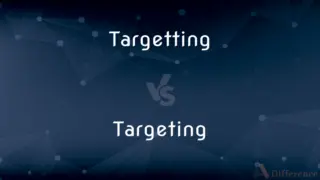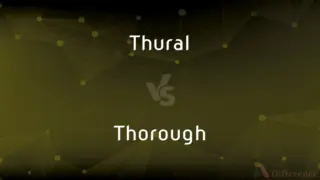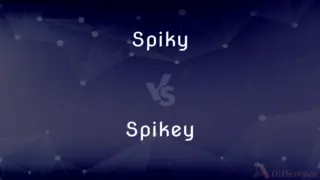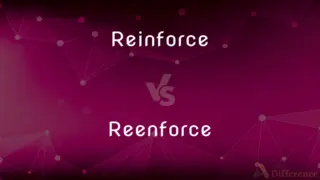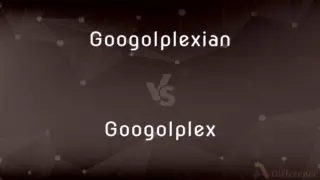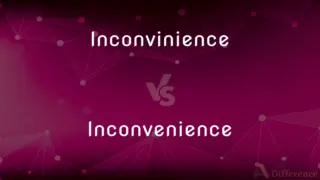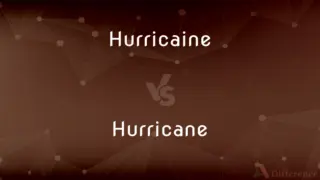Relevent vs. Relevant — Which is Correct Spelling?
Edited by Tayyaba Rehman — By Fiza Rafique — Updated on March 19, 2024
"Relevent" is an incorrect spelling. "Relevant" is the correct spelling, meaning closely connected or appropriate to the matter at hand.
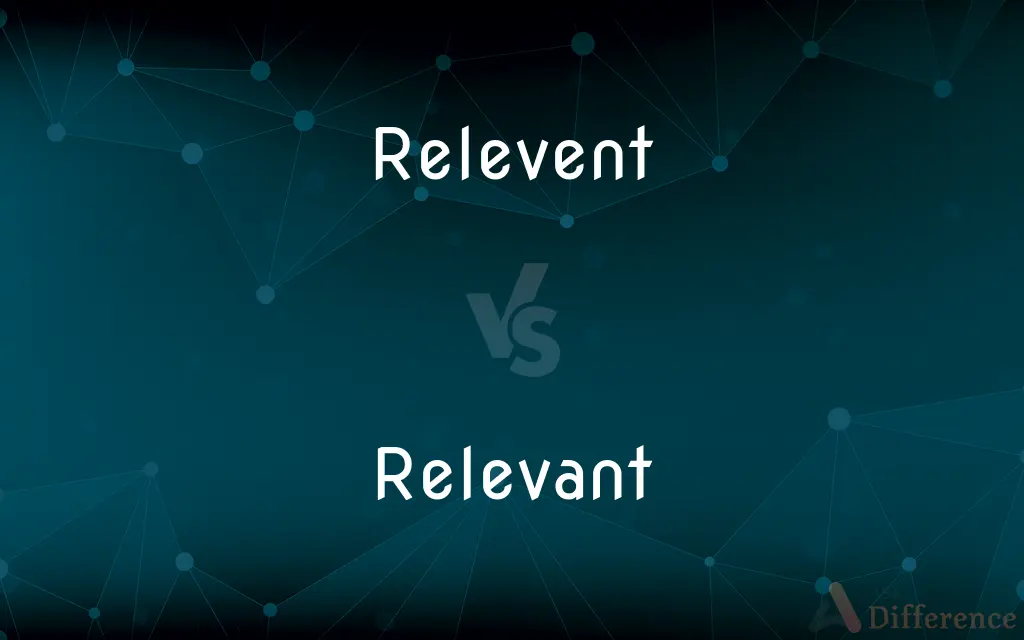
Table of Contents
Which is correct: Relevent or Relevant
How to spell Relevant?

Relevent
Incorrect Spelling

Relevant
Correct Spelling
ADVERTISEMENT
Key Differences
Think of the phrase "It's relevant to have an 'ant'."
Recall that "relevant" contains the word "lev," like in "elevate" or "level."
Note that "ant" is the ending, not "ent."
Remember it as "relev-ant" and not "relev-ent."
Associate "relevant" with "relevance," which shares the same spelling pattern.
ADVERTISEMENT
How Do You Spell Relevant Correctly?
Incorrect: The information provided was not relevent to our project.
Correct: The information provided was not relevant to our project.
Incorrect: I don't think his comments were very relevent.
Correct: I don't think his comments were very relevant.
Incorrect: It's important to stay relevent in your field.
Correct: It's important to stay relevant in your field.
Incorrect: We need to focus on the most relevent issues first.
Correct: We need to focus on the most relevant issues first.
Incorrect: Are these documents relevent to the case?
Correct: Are these documents relevant to the case?
Relevant Definitions
Pertinent to the context; significant.
The student provided a relevant answer to the question.
Applicable or appropriate to the current situation.
She always gives relevant advice.
Meaningful or purposeful in current society or culture.
He strives to make his work socially relevant.
Directly related to the subject or problem.
Her comments were relevant to the discussion.
Having bearing on or connection with the matter at hand.
That's not relevant to our argument.
Closely connected or appropriate to what is being done or considered
The candidate's experience is relevant to the job
What small companies need is relevant advice
Having a bearing on or connection with the matter at hand.
Meaningful or purposeful in current society or culture
Thought that the traditional male role of breadwinner was no longer relevant.
Related, connected, or pertinent to a topic.
(Usually and especially) Directly related, connected, or pertinent, with important ramifications or implications.
His mother provided some relevant background information concerning his medical condition.
Not out of date; current.
Relieving; lending aid or support.
Bearing upon, or properly applying to, the case in hand; pertinent; applicable.
Close and relevant arguments have very little hold on the passions.
Sufficient to support the cause.
Having a bearing on or connection with the subject at issue;
The scientist corresponds with colleagues in order to learn about matters relevant to her own research
Having crucial relevance;
Crucial to the case
Relevant testimony
Relevant Meaning in a Sentence
The teacher asked us to find articles relevant to our topic.
Only include the most relevant information in your summary.
Make sure all your points are relevant during the presentation.
She has a knack for making historical facts relevant to today's students.
Keeping the website content relevant is key to engaging visitors.
They discussed topics relevant to future technological advancements.
The book's themes are surprisingly relevant to our times.
The survey included questions relevant to consumer habits.
Staying relevant on social media requires constant updates.
The company is striving to make its products more relevant to younger consumers.
Ensure that all your references are relevant to your research question.
This law is no longer relevant to modern society.
Her research is highly relevant to the development of new technologies.
They ensured that all promotional materials were relevant to the target audience.
The course was updated to remain relevant to current industry standards.
Relevant experience is more important than education for some jobs.
The discussion turned to subjects not relevant to the workshop's goals.
It's crucial to focus on data relevant to the analysis.
The lecture was filled with examples relevant to the students' future careers.
The seminar covers areas relevant to both beginners and advanced practitioners.
Being able to sift through information and find what's relevant is a valuable skill.
He made several relevant observations during the meeting.
Keeping skills relevant is essential for career advancement.
Feedback from customers is relevant to improving our services.
The documentary highlighted issues that are relevant to many people.
Common Curiosities
Why is it called relevant?
It comes from the Latin "relevare" meaning "to raise," suggesting the idea of raising a particular topic or matter.
What is the pronunciation of relevant?
It's pronounced as /ˈreləvənt/.
What is the root word of relevant?
The root is the Latin word "relevare."
What is the plural form of relevant?
Adjectives like "relevant" don't have plural forms in English.
What is the verb form of relevant?
There isn't a direct verb form of "relevant," but it derives from the verb "relevare."
Which article is used with relevant?
Both definite ("the") and indefinite ("a" or "an") articles can be used before nouns modified by "relevant."
Is relevant a noun or adjective?
"Relevant" is an adjective.
What is the singular form of relevant?
"Relevant" is an adjective, so it doesn't have a singular or plural form.
Is relevant an abstract noun?
No, "relevant" is an adjective. However, "relevance" is the related abstract noun.
Is relevant a negative or positive word?
It's neutral, but context determines its positive or negative connotation.
Which vowel is used before relevant?
The vowel "a" is used before the "nt" in "relevant."
Is relevant an adverb?
No, "relevant" is not an adverb.
Is relevant a countable noun?
No, "relevant" is an adjective and doesn't have a countable form.
What is a stressed syllable in relevant?
The first syllable, "rel," is stressed.
Which determiner is used with relevant?
Determiners like "this" or "that" can be used, as in "this relevant fact" or "that relevant information."
What is the third form of relevant?
"Relevant" doesn't have verb forms.
Which preposition is used with relevant?
"To" is often used, as in "relevant to the discussion."
Which conjunction is used with relevant?
There's no specific conjunction exclusively used with "relevant."
What is another term for relevant?
A synonym for "relevant" is "pertinent."
What is the second form of relevant?
"Relevant" doesn't have verb forms.
Is relevant a vowel or consonant?
"Relevant" is a word, not a single letter. It contains both vowels and consonants.
Is relevant a collective noun?
No, "relevant" is not a collective noun.
Is the word relevant imperative?
No, "relevant" is not an imperative verb form.
How do we divide relevant into syllables?
It's divided as rel-e-vant.
What part of speech is relevant?
"Relevant" is an adjective.
What is the opposite of relevant?
The opposite of "relevant" is "irrelevant."
How is relevant used in a sentence?
Example: The information provided was highly relevant to our research.
Is the relevant term a metaphor?
By itself, it's not. However, it can be used metaphorically in context.
How many syllables are in relevant?
There are three syllables in "relevant."
What is the first form of relevant?
"Relevant" doesn't have verb forms as it is an adjective.
Share Your Discovery
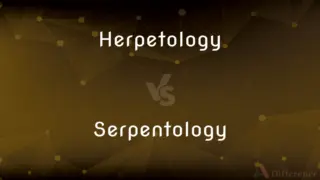
Previous Comparison
Herpetology vs. Serpentology
Next Comparison
Jibberish vs. GibberishAuthor Spotlight
Written by
Fiza RafiqueFiza Rafique is a skilled content writer at AskDifference.com, where she meticulously refines and enhances written pieces. Drawing from her vast editorial expertise, Fiza ensures clarity, accuracy, and precision in every article. Passionate about language, she continually seeks to elevate the quality of content for readers worldwide.
Edited by
Tayyaba RehmanTayyaba Rehman is a distinguished writer, currently serving as a primary contributor to askdifference.com. As a researcher in semantics and etymology, Tayyaba's passion for the complexity of languages and their distinctions has found a perfect home on the platform. Tayyaba delves into the intricacies of language, distinguishing between commonly confused words and phrases, thereby providing clarity for readers worldwide.



